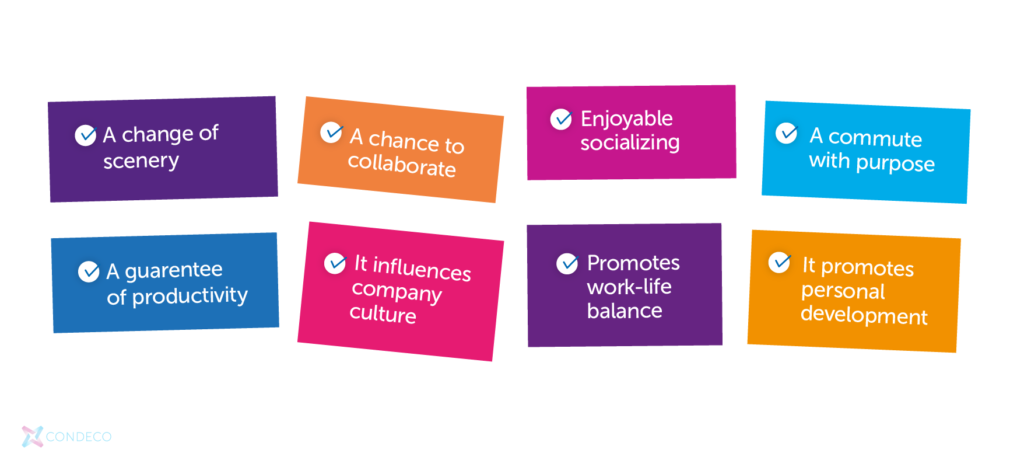

It seems incredible to say, but it just goes to show how much the world of work has been changed by the pandemic:
Who would have thought so many people would be excited to go back into the office?
The way that people feel about work has been turned on its head. Many people for whom flexible or remote work has become the norm now relish the opportunity to visit the office for a day, or even for a couple of hours. It’s good news for them as it means they’re excited, positive and emotionally engaged in their work, and it’s good news for you as an employer, as you get happy and productive workers who value the office environment.
But why has working from the office become the highlight of the week for so many? Experiences will vary across the workforce, of course, but in most cases, there are eight key drivers:

A change of scenery
Think back to the times of lockdown and the feeling of staring at the same four walls day after day. Well, for those employees who went straight into a long-term remote working model, and hardly ever visit the office, they’ll have spent a long time in the same space over the last couple of years or so.
That’s why a visit to the office every once in a while can be so useful to get a break from the old routine, and get a refreshing change of scenery with a range of different sights and sounds.
A chance to collaborate

Anyone who has ever accidentally talked over a co-worker on a meeting call (which is just about everybody) will know that collaborating by virtual means can be difficult. It’s good for exchanging information and views in a functional capacity, but it removes the nuance, flow and body language that can only come when meeting face-to-face.
The office can therefore act as a collaborative hub, where employees can book meeting rooms in advance and groups of people can work together at their best.
Enjoyable socializing
Collaboration is not the only thing that the office can act as a hub for. It can be used for less formal means, as a place where team-building exercises, social events and even parties can take place. A reshaping of the office to remove some desks and meeting rooms, replaced by more flexible space and informal breakout zones, means that the office can become the focal point for group activities. The stronger bonds that can be forged at events like these can help teams work better together, and help employees buy into a positive, community-led corporate culture.
A commute with purpose
All the three points above demonstrate that instead of employees commuting into the office because they feel they have to, they can travel in for a specific purpose (e.g., a meeting, a party, or change of scenery). This can change employees’ mentality regarding the office entirely. No longer do they feel like they’re in the office out of nothing more than contractual obligation; they feel empowered to come in, complete the task they’re coming in for, and feel positive and productive about doing it.
A guarantee of productivity

Of course, those employees need to know that when they get to the office, everything they need to fulfil that stated purpose will be ready and waiting for them. That includes access to the workstations, meeting rooms or co-working spaces that they need, without any risk of them being taken by another employee at the last minute. This is where a workspace booking solution comes into its own. In advance, and in a matter of moments, employees can search for a suitable space, check its availability for the time they need it, and make a booking. And if the space is equipped with an integrated information screen, it will display their information and enable the booker to check in, so that nobody else can ‘steal’ the space from them.
It influences company culture

Being able to see your colleagues in person can impact their wellbeing and helps them be more engaged and passionate in their role. This is a big part of positive company culture. What people experience day to day in the office can hugely impact the company’s reputation, and in turn how they attract new talent and retain existing talent. Without a physical space to go, it’s harder to implement these practices that contribute to a positive company culture.
Promotes work-life balance
It used to be that being at home more was a way to promote work-life balance, but it’s also vital the other way around. Balancing work and home can keep us on our toes but having a specific place to go will help people to get into that work mindset and keep them both separate, it also means that staff can physically leave at the end of the day, helping to mentally switch off.
It promotes personal development
Having managers present in the same room, those who are responsible for enabling development and progression, means that people can get up and seek advice face to-face rather than virtually, this can be for idea development or problem support. This can also help speed up professional development which ultimately benefits the business in the long term.



